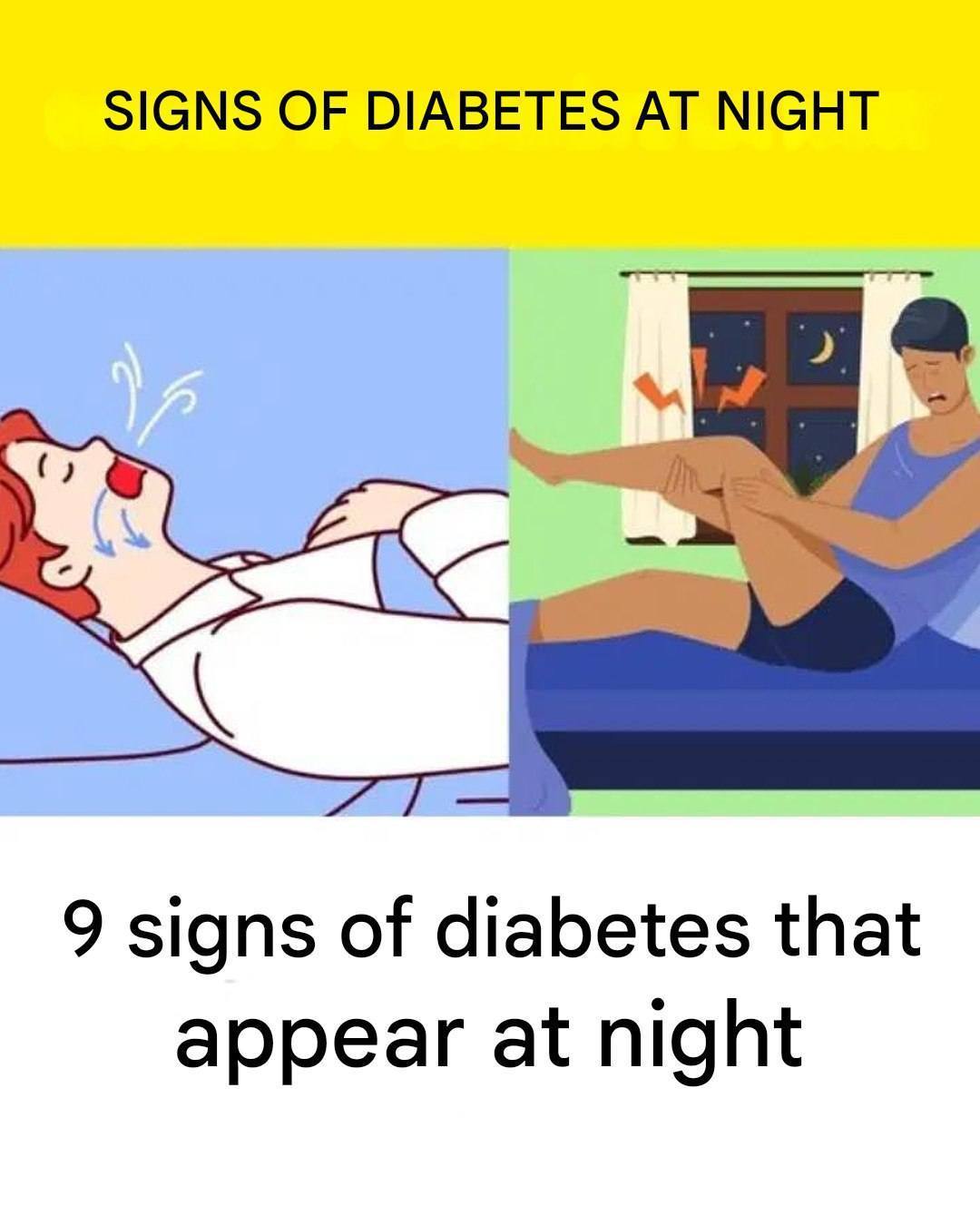Because your body is losing more water via urine (see above), you’ll feel thirstier—even in the middle of the night or in the morning. The kidneys’ effort to flush sugar draws more fluid from your body. wayneunc.org
What to watch: If you regularly wake up with dry mouth, feel unusually thirsty at bedtime or reach for water in the night more than usual.
3. Leg or Foot Cramps, Restless Legs
People with undiagnosed or uncontrolled diabetes often experience night‑time leg cramps or restless legs symptoms. These may arise due to nerve damage (neuropathy) or circulation issues tied to high blood sugar. Healthline
What to watch: Sudden leg cramps when you’re asleep, tingling or numbness in feet that wakes you up, or a restless leg feeling you didn’t have before.
4. Night Sweats or Damp Sheets
If your blood sugar dips too low overnight (hypoglycemia) or is fluctuating widely, you may sweat excessively while asleep. According to the Mayo Clinic, symptoms at night of low blood sugar include damp sheets or nightclothes due to sweating. Mayo Clinic
What to watch: Waking up drenched in sweat without obvious reason (no heater on, no heavy blanket), feeling shaky, confused or sweaty during the night.
5. Dry Mouth or Mouth Breathing Overnight
When high blood sugar causes dehydration or when you’re mouth breathing (because of congestion, etc.), you may wake up with a parched mouth or bad breath. The “unusual symptoms” list for diabetes mentions dry mouth. Healthline
What to watch: Persistent morning dry mouth, needing to drink water repeatedly when you used to not, or waking up with a bad‑taste in mouth even if you brushed teeth.
6. Headache on Waking or Poor Sleep Quality
High overnight blood sugar or hormonal shifts causing glucose fluctuations can lead to headaches in the morning or unrestful sleep. The article on high sugar at night lists “headache” among symptoms of overnight high glucose. diaTribe
What to watch: Waking with a headache when you didn’t eat a late snack or drink, feeling restless or very tired despite a full night’s sleep, or sleep that is frequently interrupted.
7. Blurry Vision or Visual Changes Upon Waking
When blood sugar is high, fluid can shift in the eye’s lens, making vision blurry. Although this may happen during the day, people may notice it more clearly when waking up. MedicalNewToday lists blurry vision as a diabetes symptom. MedicalNewsToday
What to watch: Vision that seems hazy when you first open your eyes, needing to focus or rub your eyes more than usual, especially if your vision corrects later in the day.
8. Numbness, Tingling, or “Pins & Needles” Especially at Night
Damage to nerves from high blood sugar (neuropathy) often first becomes noticeable at night when you’re still—your feet or hands may tingle or feel numb. The CDC list includes “numb or tingling hands or feet”. CDC+1
What to watch: Tingling or numbness in feet/legs that is new or worse at night, or a burning sensation that wakes you.
9. Frequent Infections or Itchy Skin That Disturbs Sleep
High sugar levels impair immune response and circulation; this may lead to frequent infections, yeast infections, or itchy skin which disturbs sleep. The “unusual symptoms” list for diabetes includes infection susceptibility and itchy skin. Healthline
What to watch: Waking with skin itching (especially lower legs), waking to urinate because of UTI symptoms, or frequent urinary/yeast infections that you attribute to “just bad luck”.
When Should You See a Doctor?
If you are experiencing one or more of these night‑time signs persistently—especially if you have risk factors (family history of diabetes, overweight, high blood pressure, etc)—see your healthcare provider and ask for a fasting blood glucose or HbA1c test.
The key things:
-
Waking multiple times to urinate without excessive fluid intake.
-
Thirst or dry mouth that is new or worsening.
-
Night sweats or sweating without another cause.
-
New leg cramps, neuropathy symptoms at night.
-
Unexplained headaches or vision changes upon waking.
These may be early signals that your body is struggling to regulate glucose properly, and catching it early could help avoid serious complications (kidney damage, nerve damage, vision loss) later on. The article on early signs states: “Left untreated, diabetes can lead to heart disease, stroke, nerve and kidney damage, vision loss…” MedicalNewsToday+1
What You Can Do Tonight and Going Forward
-
Limit late‑night sugary snacks or heavy carbohydrate meals—these can spike your blood sugar before bed. The “high blood sugar at night” article discusses food timing’s impact. diaTribe
-
Monitor how often you wake up to urinate; keep a symptom log for a week to discuss with your doctor.
-
Ensure good hydration—but avoid large volumes right before bed.
-
If you have leg cramps or tingling, check your foot health, circulation and share these details with your provider.
-
Ensure your bedroom environment supports good sleep (cool, dark, good ventilation); poor sleep quality can worsen insulin resistance.
-
Keep a list of your risk factors (family history, weight, blood pressure) and share with your doctor.
Final Thoughts
While many of these night‑time symptoms might seem minor—or easily attributed to aging, busy days or “just a bad night”—they can actually be your body’s way of signaling that something more serious is going on with your blood sugar regulation.
If you’re waking up thirsty, peeing a lot, having leg cramps, night sweats, dry mouth or tingling sensations—don’t ignore them. Ask for a diabetes screening. The earlier it’s caught, the more you can protect your health, your sleep and your future.
✨ As the image reminds us: it’s not just what you feel during the day—it’s what happens when you’re in the quiet of night that can matter.

